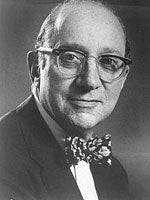Legal scholars and experts discussed the legacy and ideas of former attorney general Edward H. Levi, during a discussion at Harvard Law School on Oct. 29.
Levi, a former president of the University of Chicago, assumed the role of U.S. attorney general in 1975 at a time of depleted civilian trust in the executive branch following the resignation of President Richard Nixon in the midst of the Watergate scandal.
“Levi took restoring faith in the legitimacy of government and adherence to the rule of law as his very highest priority,” said journalist Jack Fuller, who served as Levi’s special assistant.
“It’s hard to sort of recapture that time, because it was so novel–not to have people in government do things that were illegal, but to do so many things at the same time,” said Larry Kramer, former dean of Stanford Law School and current president of The William and Flora Hewlett Foundation, who served as a young research assistant for Levi.
Harvard Law School professor Vicki C. Jackson described the accession of Levi to the role of the government’s top legal advisor as “such a relief.”
“This was a serious person. This was a person with integrity, this was a very respected scholar,” she said.
According to the panelists, during his time as attorney general Levi implemented a number of reforms meant to promote transparency and restore trust in the government, including guidelines regulating the scope of FBI activities such as surveillance and domestic regulation.
“He’s appointed by a president who was never elected. And he takes this fragile, slight, slice of legitimacy and from that restores the faith in the rule of law in the United States,” said Harvard Law School Dean Martha Minow, who moderated the panel.
Panelists included journalist Fuller, Jackson, Kramer, Harvard Law School lecturer Susan Davies, and John G. Levi ’72, chairperson of the Legal Services Corporation and son of Edward Levi. The discussion was centered around Fuller’s newly published book, “Restoring Justice: The Speeches of Attorney General Edward H. Levi,” a compendium of Edward Levi’s speeches.
Kramer said he thinks the messages of Levi’s speeches resonate well today, particularly that of the need to compromise. Levi, he said, was warning against the tendency towards stubborn partisanship that has defined the government in recent years.
He brought up a quote of Levi’s, included in Fuller’s book, as emblematic of the attorney general’s ideals.
“Inevitably in a system of divided powers there are points where responsibility conflicts, where legitimate interest and demands appear on either side. In such instances, accommodation and compromise reflecting the exigencies of the matter at hand have been not only possible but a felt necessity,” said Levi during a speech he gave at Columbia Law School on separation of powers. “The essence of compromise is that there is no surrender of principle or power on either side, but there is a respect for the responsibilities of others and recognition of the need for flexibility and reconciliation of competing interests.”
